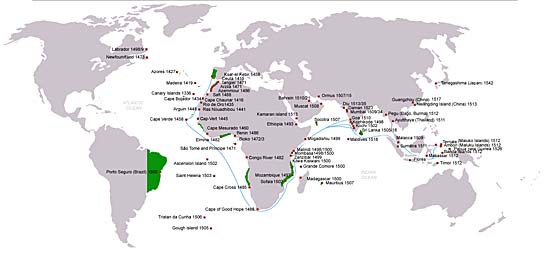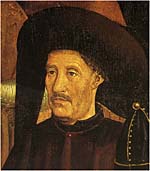
Unit 2: How Trade and Travel Changed the World
Lesson E: Rise of Early Europe
Activity 6: The Impact of Portugal
Directions: Read the information about the rise of smaller states in Europe, and be prepared to summarize what you have learned.
The story of Portugal's rise is similar to the Italian city-states in that this relatively small territory grew to greatly impact overseas travel and trade. Although Portugal had little influence over issues on the European continent, it soon altered travel and trade in the eastern Atlantic Ocean and eventually the world.
As a small state on the tip of the Iberian Peninsula, Portugal created a kingdom by defeating Islamic enemies and maintaining an eastern border with what would eventually become Spain by 1300. Competition for trade with the Ottomans in the Middle East and Italian city-states in the Mediterranean drove the Portuguese to develop methods of sailing along the coast of North Africa and Europe, where they explored trade routes to India and China. Shown here are the routes of travel and territories conquered by the Portuguese from 1415 to 1543, with spice routes to India shown in blue and territories in green.
Advances in technology and shipbuilding, as well as the contributions of Portuguese innovators such as Prince Henry the Navigator, allowed the Portuguese to create a thriving maritime empire. As these contacts increased, exchanges of goods such as spices, silk, and agriculture were shared between the European, African, and Asian worlds. Olives and grapes grown in Portugal could be exchanged for fine porcelain from China and pepper from India, and then traded with merchants throughout Europe. Many historians point to the rise of the Portuguese overseas empire as the start of globalization, as Europeans became connected with Africa, the Indian Ocean, and East Asia.
Changes to economic and political power in southern Europe focused on the role of emerging states along the borders of the Mediterranean Sea. The warfare and political changes of the late Medieval Period enabled smaller states to free themselves from larger kingdoms. This is what happened in the area that is now northern Italy, where smaller territories broke away from the aging Byzantine Empire. By the 15th century, several Italian city-states had become powerful centers of trade in southern Europe. Florence, Genoa, Venice, and smaller maritime republics connected travel and trade between Europe and the East.
Page Notes:
[1] Source: This image from http://en.wikipedia.org/wiki/File:Portuguese_discoveries_and_explorationsV2en.png is licensed under the terms of the GNU License Agreement.
[2] Source: This image from http://en.wikipedia.org/wiki/File:Henry_the_Navigator1.jpg is in the public domain because its copyright has expired.




